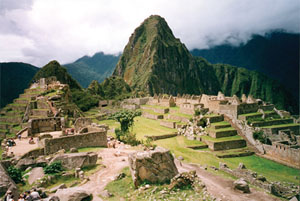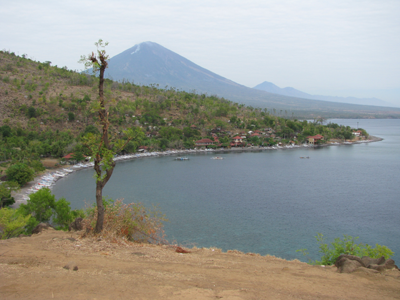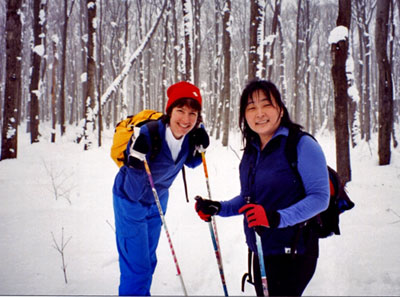7. Please tell us about your Canadian interculture experiences, living in the French-speaking province of Quebec.
From 1977 to 1986 I spent 9 of the most wonderful, exciting and formative years of my life in Quebec. Firstly I was studying French at university, and I adapted to a country within a country. I understood for the first time the meaning of Quebec as a pays apart (a country apart), bursting with nationalist fervour. Many Quebeckers were ready to take the plunge in the 1980 referendum, caught up in this fervour I truly experienced the soul of Quebec.
I learned the importance of Quebec’s history, all 400 years of it, its unique view of the rest of Canada, and the multiple aspects of Quebec culture. I took this back with me to Toronto where I felt imbued with a passion to share my Quebec experience within the Toronto educational system. I have taken a lot of this information, of my knowledge gained through those years in Quebec, and built on them many French courses that I taught here in Toronto.
8. What are the 3 favourite memories from your trips?
One of my favourite memories was definitely Krakatoa, the volcano at the southern tip of Sumatra, the way it thrusts itself out of the Indian Ocean.
Another favourite image would be Christchurch, New Zealand, a bright sunny day with a view of the Avon River meandering through downtown Christchurch. Just the atmosphere that I was a part of tasted of the freedom, freshness and lightness of travel in full flight.
The feeling I had in Kilimutu on the island of Flores, after spending 4 hours climbing to the top, was one of being in complete awe of the 3 lakes in the craters of extinct volcanoes, each lake of different colour. One was light green, the next was blood red, and the third one was off-white. Just the feeling of being there alone was just too much to describe. I knew there was a greater power out there when I saw this splendour.
9. What are the 3 most significant intercultural experiences that you made on your travels?
Teaching English in Bali was an initiation into the differences between Balinese culture and Indonesian culture and how I learned of the gap between Djakarta and other parts of the country. I also understood the phenomenal difficulties that Indonesians have in perceiving other cultures, for examples Canadian culture. They had great difficulty figuring out what snow was, or what climate changes we go through in a year, the change of the season.
Integrating into Quebec society in the late 1970s was fascinating because of people’s perceptions of me as an Italo-Canadian who wanted to master French in Quebec City. People had difficulties understanding my motives, that this was purely due to my own interest in languages, as opposed to for purely monetary reasons. There was also a problem with me understanding the fanaticism of certain French nationalists who would go to any lengths to see an independent Quebec.
Going back to the Australian outback in 1973 was acknowledging that certain parts of Australia had remained in a time warp which took me back to the 1950s, so that I had to relive for a second time the anti-immigrant feelings of many outbackers. There were fights with outsiders all the time. I went as far as changing my name from Mario to Joe not to be mistaken for Italian.
10. You had some other dicey experiences on the road. Please tell us about one.
The diciest story was when I was attacked by 9 or 10 youths after an evening in Djakarta and they ended up beating me up really badly. I was saved by a bystander who pulled me from the crowd and threw me onto a 3-wheeled bicycle and I was taken to a local police station who informed me that I had been the victim of the Sartana street gang in Djakarta, which was one of the most dangerous gangs anywhere. I came close to losing my life in Djakarta.
11. How has travel changed, how has your perception of travel changed?
My view of travel has changed since I now view it through the eyes of a 55-year old man, who acknowledges his own vulnerability as opposed to a younger traveler, invincible under any circumstances. Now I have become a much more cautious, much more aware or safety issues, than when I was younger. The world may also have become a more dangerous place, therefore I take necessary precautions that I wouldn’t even have thought of years ago. Many places I visited in the past you can’t even safely go to any more today.
12. Are there any destinations left that you haven’t seen yet or would like to revisit?
Definitely I’d like to revisit New Zealand, parts of Australia, in particular the north-eastern coast of Australia. I would like to see Argentina, Chile, parts of Polynesia, Japan and parts of Africa,especially sub-Saharan Africa. I would also like to go back to India, particularly Karala.
My next travel plans include another visit to Siberia with a stop in St. Petersburg, and a return trip to Italy to share with my girlfriend. I would also like to go back to India, particularly Karala.
Mario, despite having known you for more than 16 years, I never realized the sheer variety and number of countries you have been to and lived, worked or traveled in. I am sure there would be a million more anecdotes and interesting stories to share. Thanks for sharing your experiences and impressions of close to 4 decades of travel in various parts of the world.




